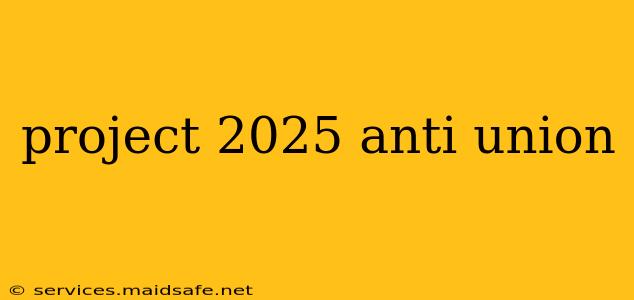Project 2025: Anti-Union Tactics and Their Impact
The year 2025 looms large in discussions about organized labor, particularly concerning the perceived anti-union strategies employed by some organizations. While "Project 2025" isn't a formally named, publicly acknowledged initiative, the term reflects a growing concern amongst labor advocates about a coordinated effort to weaken or suppress unionization efforts. This concern stems from observed trends and reported tactics deployed by businesses to counter union drives. Let's delve into the potential strategies and their implications.
What are the Alleged "Project 2025" Tactics?
Accusations surrounding anti-union campaigns often center around several key strategies:
-
Aggressive Anti-Union Campaigns: These campaigns often involve disseminating information (sometimes misinformation) to employees about the purported downsides of union membership. This can include highlighting potential dues increases, decreased flexibility, or the risk of strikes impacting employment stability. The effectiveness of such campaigns hinges on creating a sense of fear and uncertainty among workers.
-
Increased Surveillance and Monitoring: Some employers are accused of intensifying monitoring of employee communications and activities, particularly those suspected of union organizing. This can create a chilling effect, discouraging employees from openly discussing unionization. Such actions can be legally problematic if they violate employees' rights to organize.
-
Hiring Anti-Union Consultants: Many companies engage consultants specializing in "union avoidance" strategies. These consultants advise on legal compliance while devising strategies to counter union organizing drives. While utilizing consultants is legal, concerns arise when their tactics stray into unethical or illegal territory.
-
Promising Benefits and Improvements: In an attempt to preempt unionization, some companies might offer improved wages, benefits, or working conditions. While seemingly beneficial to employees, the timing of these improvements—often coinciding with unionization efforts—can be viewed as an attempt to undermine the perceived need for union representation.
-
Challenging Union Elections and Certification: Legal challenges to union elections and certification processes are another commonly reported tactic. These challenges aim to delay or prevent the official recognition of a union, often based on procedural or technical grounds.
The Impact of Anti-Union Strategies
The long-term effects of these alleged "Project 2025" tactics extend beyond individual workplaces:
-
Weakening of Collective Bargaining Power: Successful anti-union campaigns reduce the number of unionized workers, diminishing the overall strength of the labor movement and potentially leading to lower wages, reduced benefits, and decreased workplace safety standards across various industries.
-
Increased Income Inequality: By suppressing unionization, wages and benefits might stagnate for a larger portion of the workforce, contributing to an increase in income inequality.
-
Erosion of Worker Rights: Aggressive anti-union tactics can infringe upon workers' fundamental rights to organize and bargain collectively.
-
Decreased Worker Morale and Productivity: A hostile environment marked by fear and distrust can negatively affect morale and productivity.
Navigating the Challenges
The debate surrounding anti-union strategies highlights the complexities of labor relations. While employers have a right to express their views on unionization, the tactics employed should always respect the legal rights of workers and refrain from unlawful or coercive actions. Transparency, fair treatment, and respect for employees' freedom of association are crucial for building a productive and harmonious work environment.
Disclaimer: This article discusses concerns regarding anti-union strategies. It does not endorse any particular viewpoint and is intended to inform readers about ongoing discussions in labor relations. It is recommended to consult with legal professionals for specific advice on labor laws and regulations.

